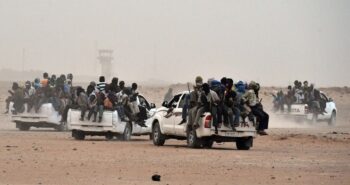Hafed Al-Ghwell

After more than a decade of political morass, Libya’s future hangs precariously in the balance between two less than optimal outcomes. One is an enduring status quo that is a playground for self-interested political elites, hybrid actors and serial agitators, atop the disaffected masses. The other is the formation of a so-called “unity government” headed by the very ruling elite that has repeatedly thwarted the country’s post-2011 aspirations.
The status quo is as unwieldy as it is untenable. The revolving door of power facilitates the rise and fall of chimeric influencers, some of them politically aspirant, others militaristically potent, all of them cloaked in a veneer of national interest while working only to further their own parochial agendas.
Meanwhile, most of the views from abroad merely offer guided tours of this maze of malignancy and its debilitating toll on a society adrift in a volatile situation that has left Libya suffocating on the threshold of chaos, with instability the only constant.
Just this week, the surprising departure of Khalid Al-Mishri as head of the High Council of State underscored the shifting sands in the balance of power. The council is recognized by most of the international community as part of Libya’s official governing structure, serving as an advisory body to the House of Representatives. Its primary role is to help guide the nation through a turbulent transition process, while addressing security issues and attempting to reconcile deep-rooted internal divisions in the country.
The council’s leadership therefore directly influences the prospects for Libya’s stabilization, since effective leaders can facilitate dialogue and foster unity among competing factions, potentially creating an environment conducive to political reconciliation and stability. Conversely, inconsistent or self-interested leadership can inflame tensions and disrupt an already fragile process of transition.
Al-Mishri’s departure is yet another illustration of the country’s unpredictable political climate and the fragility of its key institutions. The unforeseen ouster of a five-year incumbent serves only to introduce additional uncertainty at a critical juncture when Libya is striving for a lasting political settlement and stable policy frameworks, to legitimize future elections that might produce the country’s first-ever democratically elected government.
Such leadership changes also affect the council’s ability to effectively advise the House of Representatives, contribute to critical policy decisions, including the implementation of electoral laws, and help facilitate the drafting of a constitution.
At the same time, opportunists continue to pursue their own personal ambitions and petty rivalries, even if it means manipulating or subverting ongoing political processes. This constant state of flux is a significant contributing factor to disaffection among the Libyan public, raising the risk of even more turbulence in the years ahead, which is not helped by an enduring distrust of state institutions.
Divisive politics and the presence of regional and external actors who have stakes in the Libyan conflict also play a part in exacerbating the difficulties in achieving consensus or a unified national vision.
If the status quo is therefore undesirable, the alternative of a lurch toward a unity government remains, at best, a mixed blessing. While the concept might appear to be an antidote to the protracted crisis in Libya, the overall process to achieve it has been marred by cynicism and wariness — and justifiably so.
Several attempts to forge a unity government have crumbled as a result of infighting, deeply entrenched factionalism, and ever-challenging local dynamics. The current ongoing attempt has yet to bear fruit and is unlikely to fare much better than previous efforts, given that it is similarly afflicted with the maladies that mean such pursuits are granted only some measure of symbolic importance while practical effectiveness remains questionable.
The revolving door of power facilitates the rise and fall of chimeric influencers.
After all, even the most well-intentioned consensus-building endeavors are not immune to the influence of a ruling elite who are loath to relinquish their monopoly on power. They therefore continually interfere and use their resources and influence to steer outcomes in service to their own interests.
This ongoing meddling has merely intensified lines of conflict, further eroding trust among the polity and undermining the firm principles of an egalitarian society that underpin any nascent democratization process. Instead of fostering unity, these elite-driven efforts have deepened the chasms of division and perpetuated the status quo.
The continued involvement of those same political incumbents who have done little to bridge the divides so far creates an understandable skepticism about this proposed pathway. A unity government populated by those who have no qualms about undermining democracy in Libya just adds to the national strife about this faux harmony among elites, leaving Libyan spirits just as embattled as before.
Obviously, the implications of entrusting the country’s future to this ruling cabal are grave, and thus indefensible. Theoretically, such a government could help to stabilize the situation in Libya. Realistically, however, its only “success” would be to bring an element of predictability to the nation’s woes — a sort of “managed chaos,” so to speak.
However, it also runs the risk of hardening the divisions between the various factions vying for their place in the sun, while offering a veneer of legitimacy to vested interests, thereby perpetuating the very structures of power that are responsible for Libya’s present quagmire.
Meanwhile, other paths that sought to realize Libya’s post-Qaddafi aspirations for democratization raised plenty of hope, only to wither under the weight of the country’s ever-changing dynamics. Disruptive influences — internal and external — continue to shape and reshape the course and the discourse, rendering obvious solutions ineffective and erstwhile feasible transitions, infeasible.
The global community, fatigued by the enduring Libyan quagmire, now finds itself in the testing position of having to choose the lesser of two evils. The unfortunate inevitability of this, due to the external support for stabilization oscillating between the halfhearted and the blithely half-baked, leaves much to be desired.
However, few alternatives exist outside of engagement by an international community that finds itself backed into a corner and forced to choose between facilitating a unity government, with all its inherent flaws, or resigning itself to a protracted and volatile status quo.
While neither option is particularly appealing, shying away from proactive involvement would only risk exacerbating the instability. The challenge now is to strike a delicate balance between securing stability without entrenching a political landscape that is unresponsive to democratic reform.
By reassessing priorities, aligning regional interests and focusing on long-term solutions rather than short-term gains, the international community can still contribute in a meaningful way to Libya’s stability, help prevent further devastation and avert direct threats to regional, and global, security.
One can only hope, for Libya’s sake and that of its people, the final choice pays more than just lip service to the principles of unity and democracy. It is incumbent on the international community to select the lesser of two unpalatable options, and in doing so work diligently to shape a future in which Libya’s impossible choices can become, at last, a little less impossible.
***
Hafed Al-Ghwell is a senior fellow and executive director of the North Africa Initiative at the Foreign Policy Institute of the Johns Hopkins University School of Advanced International Studies in Washington, DC, and the former adviser to the dean of the board of executive directors of the World Bank Group.
_______________





